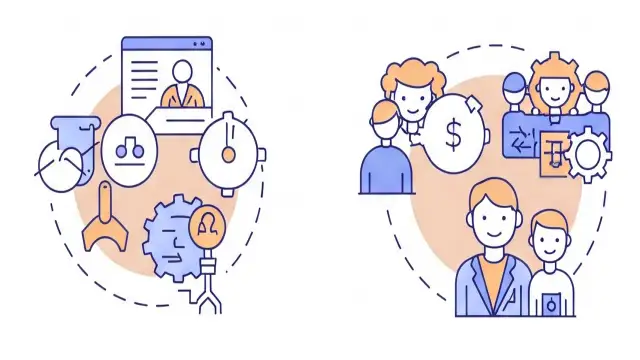Table of Contents
Beyond the Obvious: Unearthing Hidden, High-Income Careers with Lower Competition for 2025
Feeling like you’re stuck in a rat race for the same old high-paying jobs? You see the headlines, the LinkedIn profiles… everyone seems to be gunning for that VP title or the senior developer role at a FAANG company. It’s exhausting, right? The pressure, the sheer number of applicants for every single opening – it can feel like trying to win the lottery.
But here’s a little secret the career gurus don’t shout from the rooftops: some of the most lucrative and rewarding paths are hiding in plain sight, often overlooked because they aren’t glamorous, require very specific skills, or simply fly under the radar. We’re diving into hidden high-income careers, focusing on roles where the demand for qualified professionals is outpacing supply, leading to high paying jobs low competition relatively speaking, of course. We’re looking specifically in 2025 and beyond, considering trends shaping the future workforce.
Now, let’s be clear. “Low competition” doesn’t mean no competition. And “hidden” doesn’t mean nobody’s ever heard of it. It’s more nuanced. It often means:
- High Barrier to Entry (Skills/Education): Requiring specialized degrees, certifications, or rigorous training that naturally limits the applicant pool.
- Lack of Awareness: Many people simply don’t know these jobs exist or what they entail. They arent sexy enough for primetime TV shows.
- Niche Specialization: Focusing on a very specific area within a broader field.
- Perceived Lack of Glamour: Some crucial, high-paying jobs just don’t sound as exciting as “AI ethicist” or “blockchain visionary.”
So, forget the pipe dream of six figures for zero effort. That doesn’t exist. These unique career paths demand expertise and dedication. But the reward? Potentially less competition for roles offering significant financial security and often, interesting, impactful work. Let’s explore some contenders.

1. Perfusionist
- What They Do: Ever wonder who operates the heart-lung bypass machine during cardiac surgery? That’s a perfusionist. They maintain blood flow and oxygen levels, essentially keeping the patient alive while the heart is stopped. Critical doesn’t even begin to cover it.
- Why High Income?: Immense responsibility, highly specialized skills, requires calm under extreme pressure, direct impact on patient survival. Hospitals need them and pay accordingly.
- Why Low Competition?: Requires a specific Master’s degree from a limited number of accredited programs. Intense training, high stakes, and low public visibility mean fewer people pursue this path compared to, say, nursing or general surgery. Their vital work often goes unnoticed by the general public.
- 2025: With an aging population needing more complex cardiac procedures, demand is expected to remain strong or grow. Definitely one of the top hidden high-income careers.
2. Genetic Counselor
- What They Do: These professionals help individuals and families understand and adapt to the medical, psychological, and familial implications of genetic contributions to disease. They interpret genetic test results, assess risk, and provide counseling and support. Part science, part empathy.
- Why High Income?: Requires a Master’s degree in Genetic Counseling. Highly specialized knowledge blending genetics, counseling, and healthcare. Increasing demand as genetic testing becomes more common in personalized medicine.
- Why Low Competition?: Like perfusion, requires a specific graduate degree with limited program spots. It’s a demanding field requiring strong scientific aptitude and excellent interpersonal skills. Relatively new field compared to traditional medicine.
- 2025: Personalized medicine and preventative health based on genetics are booming. Demand for genetic counselors is projected to grow much faster than average. A solid future proof career choice.
3. Actuary
- What They Do: Actuaries analyze the financial costs of risk and uncertainty. They use mathematics, statistics, and financial theory to assess the risk of potential events and help businesses and clients develop policies that minimize that risk. Think insurance pricing, pension plan stability, etc.
- Why High Income?: Requires passing a notoriously difficult series of professional exams (takes years!). Highly analytical skills are essential. Their work is fundamental to the financial health of insurance companies and many other businesses.
- Why Low Competition?: Those exams! They act as a significant barrier to entry, filtering out many potential candidates. The work is intellectually demanding and requires a very specific type of quantitative brainpower. Fewer people self-select into this field.
- 2025: Always in demand. New risks constantly emerge (climate change, cybersecurity, pandemics), requiring actuarial expertise to model and manage. Stable, respected, and financially rewarding. It’s less about finding a job no one wants, and more about finding one fewer people are qualified for or willing to endure the qualification process for.
4. Technical Writer (Specialized Niche)
- What They Do: Okay, “technical writer” might not scream “hidden gem,” but specialized technical writers are gold. We’re talking about people who can clearly explain incredibly complex processes or technologies think advanced software documentation, pharmaceutical research protocols, aerospace engineering manuals, complex financial regulations.
- Why High Income?: The ability to understand deeply technical subject matter and communicate it clearly to a specific audience (engineers, regulators, end-users) is rare and valuable. Mistakes in documentation can be costly or dangerous. Demand is high in regulated or highly complex industries.
- Why Low Competition (in Niches): Requires a unique blend of writing skill, technical aptitude/domain knowledge, and attention to detail. Generalist writers often lack the deep subject matter expertise. Finding someone who understands quantum computing and can write clearly about it? Not easy.
- 2025: As technology and regulations become more complex, the need for skilled technical communicators who can bridge the gap will only increase. This is one of those high paying jobs low competition areas if you find the right niche.
5. ESG Analyst
- What They Do: Environmental, Social, and Governance (ESG) analysts evaluate companies based on their performance in these three areas. They help investors make socially conscious investment decisions and help companies improve their sustainability and ethical practices.
- Why High Income?: Growing investor demand for ESG factors, increasing regulatory requirements worldwide. Requires a blend of financial analysis, data science, and expertise in environmental and social issues. It’s a hot field where skilled professionals are scarce.
- Why Low Competition?: Relatively new field, so the pool of experienced professionals is still small. Requires interdisciplinary knowledge that doesn’t fit neatly into traditional finance or environmental science buckets. Educational pathways are still evolving. Its a prime example of low competition jobs 2025 trend.
- 2025: Explosive growth expected as ESG becomes mainstream in investment and corporate strategy. Demand is rapidly outstripping the supply of qualified analysts.
Finding Your Own Hidden Path
This list isn’t exhaustive, obviously. Think about other niche roles:
- Power Plant Operators: Huge responsibility, specialized training, critical infrastructure.
- Elevator Mechanics: Highly skilled trade, strong unions, always needed.
- Medical Physicists: Applying physics principles to medicine (e.g., radiation therapy). Requires advanced degrees.
- Forensic Accountants: Investigating financial discrepancies, requiring accounting and investigative skills.
The common thread? Specialization. Deep knowledge in a specific area where demand is quietly growing, or where the path to entry naturally limits the crowd.
How do you find your potential hidden high-income career?
- Look Sideways: What related fields exist around the popular careers? What support roles are essential but less visible?
- Follow the Complexity: Where are regulations getting tighter? Where is technology becoming incredibly specialized? Complexity often breeds demand for niche experts.
- Assess Your Unique Blend: What unusual combination of skills or interests do you have? Could they apply to an emerging field like ESG or a specialized technical writing niche?
- Talk to People: Conduct informational interviews with people in fields that sound intriguing, even if obscure. Ask about the challenges, rewards, and the path they took. You might be surprised what you uncover.
- Don’t Fear the “Boring”: Some incredibly stable and high-paying jobs aren’t flashy. Actuarial science or technical writing might not make exciting dinner party conversation, but they offer intellectual stimulation and financial security.
The Bottom Line
Chasing the same high paying jobs as everyone else can be a recipe for burnout and frustration. By looking for unique career paths and hidden high-income careers roles that value deep specialization and often fly under the radar you might find a more rewarding and less crowded path to financial success in 2025 and beyond. It takes research, potentially specific training, and a willingness to look where others aren’t. But isnt finding a fulfilling, well-compensated career with a little less competition worth the effort?

